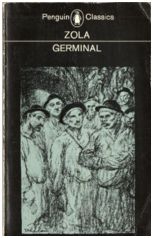Book Review: Germinal, Émile Zola
 I don’t know how I’ve managed to wait so long to read one of Zola’s most famous works – and the thirteenth novel in his Rougon-Macquart series.
I don’t know how I’ve managed to wait so long to read one of Zola’s most famous works – and the thirteenth novel in his Rougon-Macquart series.
Published in 1885 and set in 1866, this is the story of Etienne Lantier, whose inability to find a job as a mechanic leads him to take on horrendous, physically-grueling work as a miner at Le Voreux mines in northern France.
I enjoyed similar works about the meat-packing plants in Chicago (The Jungle), the cotton industry in northern England (North and South), and the agricultural laborers in Italy’s poor Abruzzo region (Fontamara), but this description of the inhuman work below-ground in the French mines and the abject poverty and sense of despair in the miner’s village was the most powerful depiction of human misery during the Industrial Revolution I’ve read.
Zola depicts a wide range of characters, with varying levels of focus – the miners and their families living in abject poverty in the mining community, the merchants around the area, and the overseers and managers and the wealthier families whose lives are financed by investments in the mines.
The scenes illustrating the disconnect between the miners and the lives of the local managers and investors are especially powerful, and I would have liked to see more of them. One moving scene has the wife of a mine manager providing Parisians a tour of the squalid homes of the miners. She explains the mining families’ lives in the village and all the benefits they derive from this supposedly generous relationship, while the mining families themselves sit silently and with empty stomachs as the perverted performance plays out before them.
The scenes down at work in the mine, and all the horror and danger such work entails are powerful segments in the book, as are following the days of the poor families attempting the impossible: getting bread on the table for their large families. As a reader, my heart broke as the mothers eyed their toddlers while counting down the years until they could go to work in the mines in order to bring money back for the families. In the absence of any hope, promiscuity appears to be the only past time for the miners, and young boys and girls quickly begin the cycle of bearing more children whose mouths will be impossible to feed.
Before this backdrop, Etienne longs for a workers’ revolution and orchestrates a general strike. The strike quickly grows out of control and the plight of the miners and their families declines. The miners quickly discover that the International movement upon which – through their faith in Etienne – they placed all their hopes, is not much more interested in them as individuals than the mining management. Following the strike, the survivors return to the pits more battered than ever.
This is an extremely powerful novel. Although it would have been revolutionary at the time and shone a light on the poverty and desperation of mining workers, which was Zola’s intent, it remains an extraordinary book to modern audiences. Germinal quickly draws readers in to village life and the wide cast of characters as they struggle each day to survive.
Oh, Kimberly! This is my favorite book of all times. The reason I love Elena Ferrante’s The Neapolitan novels so much is because of her wide cast of characters. I love Zola because of his political and social engagement and his writing captured me when I was still very young. I’m so fortunate to have read his work in French but so glad you got to read Germinal, probably his most renowned in the series.
For the month of April I will do a French writers challenge from A to Z, mixing classic and contemporary writers. A French blogger friend who loves and knows literature much more than I do (at least for the modern authors) will check my list.
But I immediately stared the list with Z.
Thank you for a great post, reminding me of a great writer and great man.
So glad to see this, Evelyne. And I can understand why it’s one of your favorites. I love to read in French and do so quite often, but I never would have attempted this novel in the original version. : ) Although, to be fair, I admit to not having understood about a half of the mining terms in my native English, either! Will be looking out for your French writers’ series in April – glad to see you will have a mix of classic and contemporary. Always on the lookout for new French writers!
Germinal had a big impact on me when I read it in college, leading me to read some large number of Zola’s books. Perhaps I’ll revisit it (although many scenes are still vivid, 45 years on). Thank you. I don’t know Fontamara, but will look it up.
I think you’ll like it, Brad. A beautiful book about the abject poverty of agricultural workers in the Italian region of Abruzzo – a region I love to hike and ski in today, with its spectacular natural beauty – by Ignazio Silone.
[…] blogger friend Kimberly who lives in Italy wrote about her own experience as she read recently Germinal for the first […]